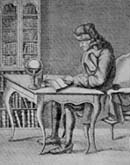

29 October 1751
[ Tallentyre's Commentary: "His secretary, Darget"--reserved, discreet, and trustworthy. In November, 1750, Voltaire had written and told Mme. Denis that when Darget lost his wife King Frederick had written him a touching letter of sympathy: and, the same day, made a shameful epigram upon her. In the affair with Hirsch, the money lender, Darget had pleaded Voltaire's case with angry Frederick: and he was often the medium of letters and messages between the King and his guest."I have reconciled him (d'Argens) with Algarotti." The Marquis d'Argens. Algarotti was an agreeable Italian who had been a visitor at Cirey. He had written a book called Newtonianism for Ladies, which had been completely eclipsed by Voltaire and Mme. du Châtelet's Elements of Newton's Philosophy. ]
[ VSA Commentary: This letter is one of those written by Voltaire to Madame Denis from Prussia. André Magnan has shown conclusively that these letters were subsequently modified by Voltaire, after his falling out with Frederick. ]
Potsdam, October 9, 1751.My dear plenipotentiary, I am much afraid that my letters will not go via Lord Tyrconnel much longer. He has taken it into his head to burst a large blood-vessel in his chest. It is the broadest and strongest chest imaginable, but the enemy has a footing, and the worst is to be feared.
I am always dreaming of that peel of an orange: I try not to believe it, but I am afraid of being like deceived husbands, who are always forcing themselves to think their wives are faithful. The poor wretches feel at the bottom of their hearts something that warns them of their betrayal.
What I am very sure of is that my gracious master has honoured me with a very sharp bite of his teeth in the Memoirs he has written of his reign since 1740. There are several epigrams in his verses against the Emperor and the King of Poland. Well and good: a king who writes epigrams against kings will naturally write them on his ministers: but he should spare the nobodies.
You must know that his Majesty, in his after-dinner stories, has insinuated a number of little things about his secretary, Darget, at which the secretary is horrified. He makes him play a very odd role in his poem, the Palladium: and the poem is in print. It is true, there are very few copies to be had.
What shall I say? That there is no need to be inconsolable if the great love the nobodies though they laugh at them? But suppose they laugh at them and do not love them--what then? We must laugh in our turn, in our sleeves, and leave them not the less. I must have a little time to remove the money I have invested in the funds here. I shall devote this time to work and patience: and the rest of my life to you.
I am much pleased at the return of brother Isaac d'Argens. He was a little uproarious at first, but now he has put himself in tune with the rest of the orchestra. I have reconciled him with Algarotti. We live like brothers: they come to my room, which I hardly ever leave: from there we go to sup with the King, and sometimes are gay enough. The man who fell from a steeple, and, finding his passage through the air soft, said, Good! provided it lasts, is much as I am.
Goodbye, my dear plenipotentiary: how I wish I could fall on to the top of my house in Paris!